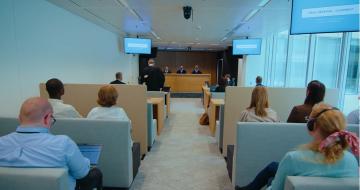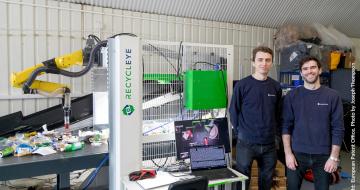Following the meeting of the Copyright and Related Rights Section of the Intellectual Property Council (hereafter "the Section") on 12 October 2007, the Intellectual Property Office (hereafter "IPObel"), carried out an analysis of the European draft on digital libraries and its impact on the Belgian legislation, at the request of the Section. Representatives of the three Communities, the Royal Library, the Royal Belgian Film Archive, the Federal Public Planning Service Science Policy, the CIUF (Conseil Interuniversitaire de la Communauté française) and representatives of the Universities of Ghent and Leuven were invited to attend the meetings of the Section to discuss this topic.
As a matter of fact, the various national, European or international projects for the digitalisation and online accessibility of collections raise the question of whether exclusive intellectual property rights are the most appropriate legal instrument to enable institutions of public interest (hereafter the "INSTITUTIONS") to carry out their mission of preserving cultural and scientific heritage as well as making it accessible, on the one hand, and to enable rightholders to promote and exploit their creations, on the other hand. Rightholders express the wish to participate in the digitalisation process of the cultural and scientific heritage. In this context, they refer to the concept of "shared heritage", meaning heritage consisting of works and performances made profitable by the INSTITUTIONS. The rightholders think that the exclusive rights in this situation meet the needs of the INSTITUTIONS for the realisation of their projects of digitalisation and accessibility of their collections. However, the INSTITUTIONS believe that the strict application of exclusive rights does not fully address the problems encountered by the INSTITUTIONS. If exclusive rights are not the most appropriate legal instrument, the question is raised whether exceptions, legal licenses or other legal mechanisms are sufficient to address the needs of all parties involved in these digitalisation projects.
The objective of the IPObel’s analysis was to identify the types of cases encountered by libraries, museums, archives and film museums with a public interest mission in the context of reproduction and communication to the public of works, performances and databases. The IPObel identified three cases. The first case concerns the digitalisation of protected works, performances and databases by the INSTITUTIONS, as well as their internal communication (for example via the intranet) for merely internal purposes. The second case concerns the digitalisation of works, performances and protected databases by the INSTITUTIONS, as well as the communication and making them available on their premises for "third party users" for research and/or educational purposes. The third case is similar to the second, except that the digitalised works, performances and databases are made available to "third-party users" who can access them outside of the INSTITUTIONS’s premises.
After defining these cases, they were examined with regard to the legal provisions that could be applicable to them. These types of cases also served as a possible source of inspiration for any amendments or the establishment of new standards, ranging from the least restrictive provisions (exceptions) to the most restrictive (exclusive rights) for INSTITUTIONS.
A second version of this analysis summarised the opinions issued on 3 June 2008 at European level by the High Level Expert Group within the framework of the Final Report on Digital Preservation, Orphan Works and Out-of-Print Works by the Copyright Subgroup. This second version also clarified to which extent the acts of reproduction and communication to the public of works, performances or databases carried out by the INSTITUTIONS in the relevant types of cases, are covered by the Belgian legal provisions relating to copyright. In addition, this version is intended to be a line of thinking for the Belgian legislator, taking into account both the European recommendations and the examination of the Belgian legal provisions.
This opinion is not intended to be exhaustive with regard to the foreign legal systems that can be applicable to the three identified types of cases, the questions raised, or the suggested lines of thinking.
Moreover, the IPObel’s analysis is limited in scope. It does not entail an examination of the legal provisions applicable to the specific cases where commercial acts are carried out. Such an examination could, if necessary, be the subject of a future complementary study. The practice of "inter-library loans" was not examined either.
Furthermore, when the IPObel's analysis touched on the issues of the financial and human costs of the INSTITUTIONS, its text is based on the interviews with the consulted INSTITUTIONS, not on an investigation of these INSTITUTIONS’ funding.
This opinion reflects the views of the Section's members and experts, as well as the views of the invited experts (see list attached), on the legal analysis carried out by the IPObel (see full analysis attached).
The opinion presents the recommendations that were drawn up at European level and that are intended for all stakeholders (the State, rightholders, management companies, and users) involved in digital library projects.
The opinion also contains a summary of, on the one hand, the conclusions of the non-exhaustive legal analysis carried out by the IPObel on the legal provisions applicable to the three types of cases, and, on the other hand, the lines of thinking which would address the needs of the various parties involved in the three identified scenarios. This summary also includes the comments made by both the members of the Section and the experts between 15 February 2008 and 25 June 2009.


